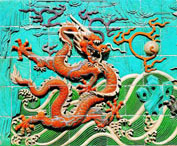 Besides imposing palaces and various buildings for sacrificial ceremonies, the emperors of the past dynasties left the ancient capital of Beijing many imperial gardens in varied styles, including the Summer Palace, the Yuanmingyuan Garden, Beihai Park, and Shichahai. Of these gardens, Beihai Park is nearest to the Forbidden City.
Besides imposing palaces and various buildings for sacrificial ceremonies, the emperors of the past dynasties left the ancient capital of Beijing many imperial gardens in varied styles, including the Summer Palace, the Yuanmingyuan Garden, Beihai Park, and Shichahai. Of these gardens, Beihai Park is nearest to the Forbidden City.
Northwest of the Forbidden City's north gate there is a time-honored garden that features picturesque landscapes. This garden is called Beihai Park and has a history of nearly 1,000 years. As early as the Liao Dynasty (916-1125), the royal family transformed it into a recreational venue by building lots of architectural features on the park's Jade Islet. Compared with Britain's St. James's Park, built in the early 16th Century during the reign of the King Henry VIII, and Japan's Katsura Detached Palace, built in the 17th Century, Beihai is six to seven hundred years older. It is thus reputed to be "the earliest imperial garden in the world." It is also one of the oldest and best-preserved imperial gardens in China.
Dadu, the capital of the Yuan Dynasty (1127-1368), was built and expanded with the Jade Islet as its center, and was the predecessor of today's Beijing. After further construction and renovation of Beihai during the Ming and Qing Dynasties (1368-1911), it became a garden that combined the magnificence of imperial palaces, the sacredness of religious architecture, and the elegance of South China's gardens. Because of the exquisite gardening techniques used in its construction, it occupies an important position among China's classical gardens.
Beihai Park covers an area of 68.2 hectares, of which 29.3 hectares are land and 38.9 hectares are water. The layout of the park is based on Chinese ancient myths. In the park, the Jade Islet, the Round City, and the Shuiyu (Water and Cloud) Pavilion symbolize the three legendary islands of Penglai, Yingzhou, and Fangzhang, which are inhabited by celestial beings. The Jade Islet is in the center of the park, and the White Dagoba is the main structure on the small island. In the western part of the islet, there are five pavilions along the banks of the lake. From a distance, their reflections resemble five dragons floating on water. Therefore, these pavilions are called the Five Dragon Pavilions. During the Qing Dynasty, emperors and empresses appreciated the moon, went fishing, and watched pyrotechnic displays here.
The Nine-Dragon Screen is a must see for tourists who visit Beihai Park. In China, the emperors regarded themselves as the Sons of Heaven and Authentic Dragons. According to Chinese culture, the number "nine" symbolizes supreme dignity; and therefore so does the Nine-Dragon Screen.
The screen is built of colored, glazed tiles. There are only three Nine-Dragon Screens in China, of which the one in Beihai is the only that has nine dragons playing in the waves carved on both sides. The dragons bare their fangs and brandish their claws as if they were alive. On the edges and top of the screen, there are more than 600 smaller dragons in various shapes, fully displaying the features of traditional Chinese architecture. Although this screen is situated in a remote corner of the Park, it attracts countless visitors each day.
Transportation: Bus 5、60、101、103、109、111.
Admission:5yuan(60 US cents);Through Ticket:10yuan(US$1.25)
(China Pictorial February 8, 2003)
|

